| List of Oils Tested | |
| • AMSOIL Signature Series | • Petro-Canada SUPREME Synthetic |
| • Pennzoil Ultra | • Quaker State Ultimate Durability |
| • Lucas Synthetic | • Red Line High Performance |
| • Mobil 1 Extended Performance | • Royal Purple High Performance |
| • Castrol Edge® Titanium Fluid Strength | • Valvoline SynPower® Full Synthetic |
Each oil was subjected to the following ASTM test methodologies:
• Four-Ball Wear Test (ASTM D4172 Mod.)
• Total Base Number (ASTM D2896)
• Cold Cranking Viscosity (ASTM D5293)
• Thermo-Oxidation Engine Oil Simulation Test (TEOST, ASTM D6335)
• NOACK Volatility Test (ASTM D5800)
Update: In 2016 AMSOIL subjected Royal Purple 5W30, Mobil1 Extended Performance 5W30 and AMSOIL signature series 5W30 to ASTM TEOST 33c test. For detailed test results visit 2016 5W30 Oil Comparison TEOST 33c Results page
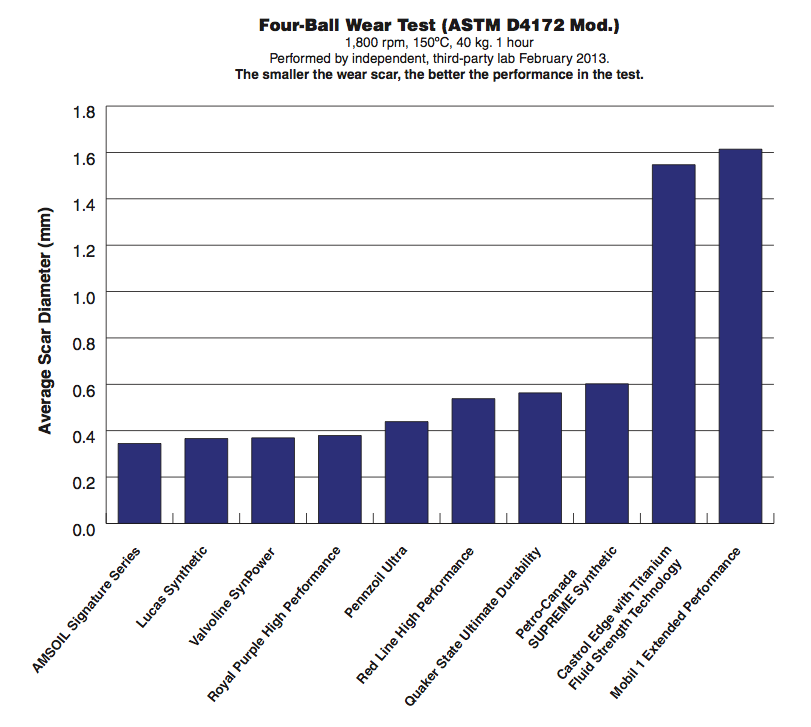 According to the ASTM, the Four-Ball Wear Test can be used to determine the relative wear preventive properties of lubricating fluids in sliding contact under the prescribed test conditions. No attempt has been made to correlate this test with balls in rolling contact. The user of this test method should determine to his own satisfaction whether results of this test procedure correlate with field performance or other bench test machines.
According to the ASTM, the Four-Ball Wear Test can be used to determine the relative wear preventive properties of lubricating fluids in sliding contact under the prescribed test conditions. No attempt has been made to correlate this test with balls in rolling contact. The user of this test method should determine to his own satisfaction whether results of this test procedure correlate with field performance or other bench test machines. Although not widely used as an engine oil test, the Four-Ball Wear Test provides a means of comparing relative wear-protection properties of lubricating oils. To better differentiate between lubricants, the severity of the test was increased with higher rpm and temperature (the test standard allows for running the test under modified parameters). The size of the scar as a result of the test indicates the level of wear protection the lubricant provides.
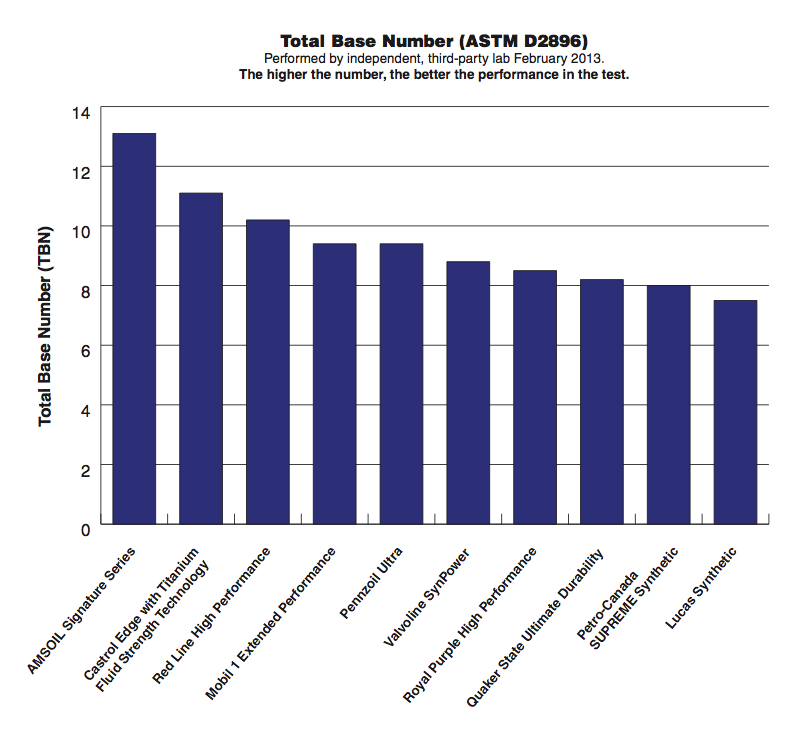 Total Base Number (TBN) is the measure of a lubricant’s reserve alkalinity, which aids in the control of acids formed during the combustion process. TBN can also be used as a measure of lubricant degradation in service. Motor oils that have a high TBN and demonstrate good TBN retention are known to effectively reduce the corrosive effects of acids over an extended period.
Total Base Number (TBN) is the measure of a lubricant’s reserve alkalinity, which aids in the control of acids formed during the combustion process. TBN can also be used as a measure of lubricant degradation in service. Motor oils that have a high TBN and demonstrate good TBN retention are known to effectively reduce the corrosive effects of acids over an extended period.
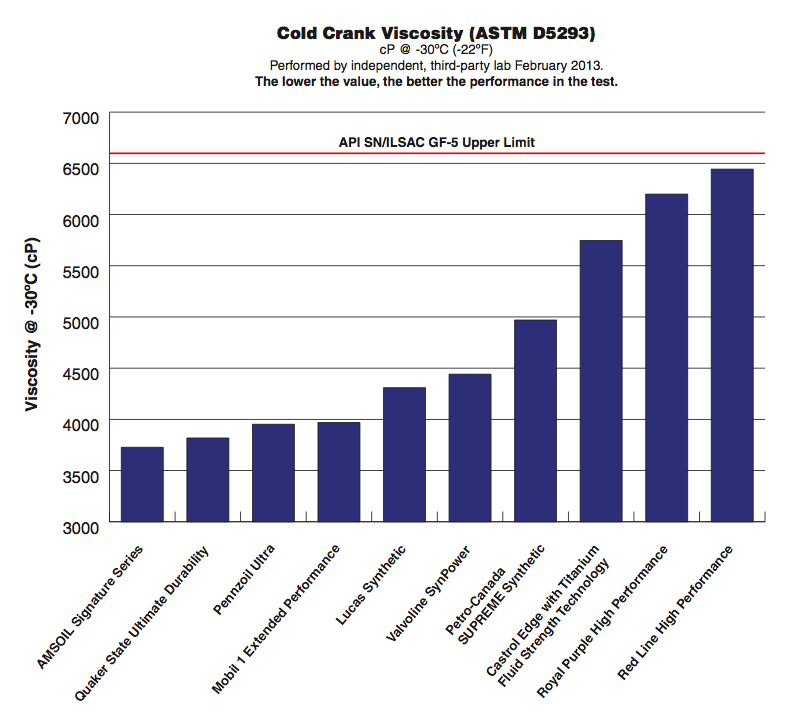 The Cold Crank Simulator Test determines the apparent viscosity of lubricants at low temperatures and
The Cold Crank Simulator Test determines the apparent viscosity of lubricants at low temperatures andThe test was performed at -30°C (-22°F). Results are reported in centipoise (cP), with lower values reflecting easier cold starts and reduced battery strain. To meet the API SN and ILSAC GF-5 motor oil specifications, a motor oil’s cold crank viscosity must not exceed 6,600 cP.
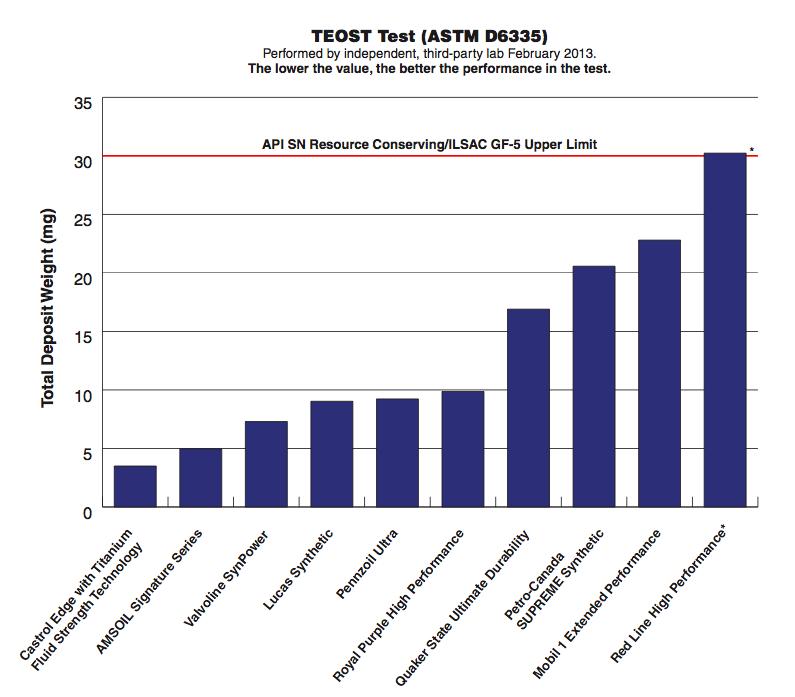 Motor oils can form deposits when exposed to increased heat, reducing efficiency and contributing to poor overall performance. According to the ASTM, the TEOST test method is designed to predict the high temperature deposit forming tendencies of an engine oil.
Motor oils can form deposits when exposed to increased heat, reducing efficiency and contributing to poor overall performance. According to the ASTM, the TEOST test method is designed to predict the high temperature deposit forming tendencies of an engine oil. This test method can be used to screen oil samples or as a quality assurance tool. Given the number of vehicles now equipped with direct fuel injection, turbochargers and other performance-enhancing technologies that increase heat, deposit control has taken on increased importance. To meet the API SN Resource Conserving and ILSAC GF-5 motor oil specifications, a 5W-30 motor oil must limit total deposit formation to 30 mg or less.
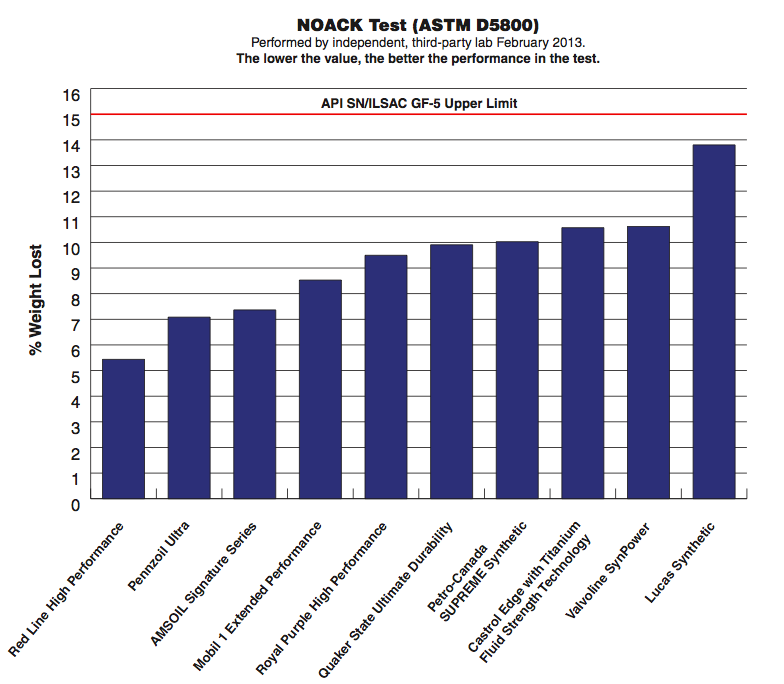 The NOACK Volatility Test determines the evaporation loss of lubricants in high-temperature service. Accord- ing to the ASTM, “Evaporation may contribute to oil consumption in an engine and can lead to a change in the properties of an oil.” As with the TEOST test, low values in the NOACK Volatility Test are of particular benefit in modern, hot-running engines.
The NOACK Volatility Test determines the evaporation loss of lubricants in high-temperature service. Accord- ing to the ASTM, “Evaporation may contribute to oil consumption in an engine and can lead to a change in the properties of an oil.” As with the TEOST test, low values in the NOACK Volatility Test are of particular benefit in modern, hot-running engines. In the NOACK test, a candidate oil is exposed to heat and circulating air. Following 60 minutes, the remaining oil volume is weighed and compared to the original weight, with the difference reported as the percentage of weight lost. Results must be limited to 15 percent or less to meet the API SN and ILSAC GF-5 specifications.
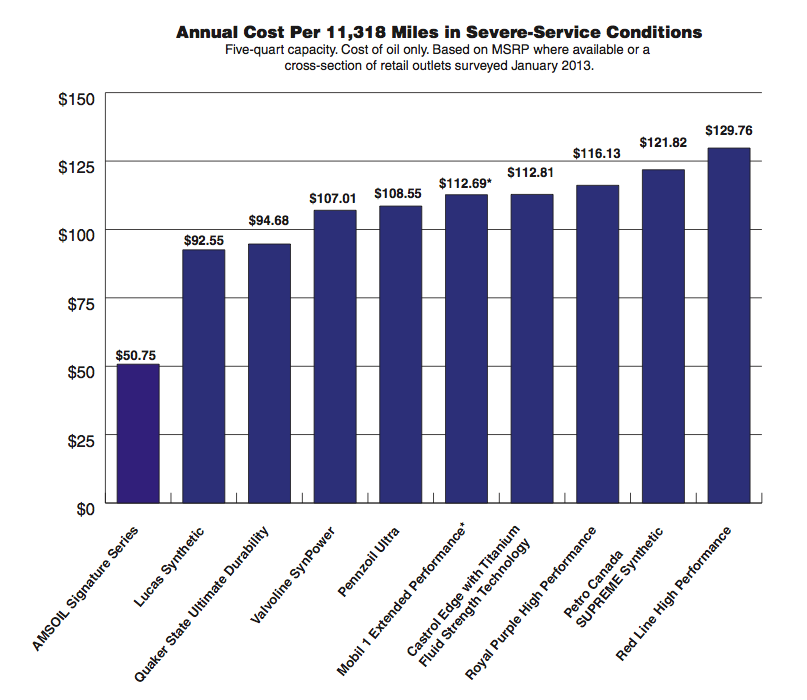 Although AMSOIL Signature Series Synthetic Motor Oil is recommended for 25,000 miles/one year in normal service, light-duty vehicles accumulate an average of 11,318 miles a year and are generally used in driving conditions that fall under the severe service category. For those reasons, overall annual cost is evaluated at 11,318 miles under severe service driving conditions. Signature Series Synthetic Motor Oil carries a drain interval of up to 15,000 miles/one year, whichever comes first, in severe service. Because the other nine oils do not carry a recommended drain interval,
a drain interval of 4,777 miles was used, which represents the average drain interval of motorists as reported in the 2012 National Oil & Lube News Operator’s Survey.
Although AMSOIL Signature Series Synthetic Motor Oil is recommended for 25,000 miles/one year in normal service, light-duty vehicles accumulate an average of 11,318 miles a year and are generally used in driving conditions that fall under the severe service category. For those reasons, overall annual cost is evaluated at 11,318 miles under severe service driving conditions. Signature Series Synthetic Motor Oil carries a drain interval of up to 15,000 miles/one year, whichever comes first, in severe service. Because the other nine oils do not carry a recommended drain interval,
a drain interval of 4,777 miles was used, which represents the average drain interval of motorists as reported in the 2012 National Oil & Lube News Operator’s Survey. Although Mobil 1 Extended Performance is recommended for 15,000 miles in out-of-warranty vehicles in certain driving conditions, its extended drain recommendation does not apply for this evaluation. According to the official statement on the Mobil 1 Extended Performance label, “Extended service is not recommended in severe service applications involving racing and commercial use, frequent towing or hauling, extremely dusty or dirty conditions, or excessive idling.”
As engines continue to evolve and demand more from motor oil, the need for premium lubrication becomes more critical. Industry-standard testing performed by an independent, third-party laboratory reveals AMSOIL Signature Series Synthetic Motor Oil to be the overall top-performing oil in these tests. When considering the savings of time and money available due to its 15,000-mile/one-year drain interval in severe service, Signature Series is also the most economical choice.
 Las Vegas Taxi Cab Field Study
Las Vegas Taxi Cab Field Study Motor Oil Comparison 2013
Motor Oil Comparison 2013 Diesel Fleet Fuel Economy Study in
Diesel Fleet Fuel Economy Study in Marine E-TEC Field Study (G2968) (1.2 MB PDF) AMSOIL HP Marine Synthetic 2-Stroke Oil prevented piston skirt scuffing and cylinder bore scuffing in a 250-hp Evinrude E-TEC marine engine during more than 500 hours of real-world use at the engine's lean-mix oil setting.
Marine E-TEC Field Study (G2968) (1.2 MB PDF) AMSOIL HP Marine Synthetic 2-Stroke Oil prevented piston skirt scuffing and cylinder bore scuffing in a 250-hp Evinrude E-TEC marine engine during more than 500 hours of real-world use at the engine's lean-mix oil setting.  A Study of INTERCEPTOR® Synthetic 2-Stroke Oil
A Study of INTERCEPTOR® Synthetic 2-Stroke Oil 3,469-Mile Case Study in Rotax E-TEC Engine (G3038) (1.1 MB PDF) AMSOIL submitted the pistons from a Ski-Doo Rotax E-TEC 800R engine to an ASTM-calibrated rater following 3,469 miles of aggressive trail riding to reveal that AMSOIL INTERCEPTOR® Synthetic 2-Stroke Oil provided outstanding protection and prevented piston skirt scuffing and ring sticking.
3,469-Mile Case Study in Rotax E-TEC Engine (G3038) (1.1 MB PDF) AMSOIL submitted the pistons from a Ski-Doo Rotax E-TEC 800R engine to an ASTM-calibrated rater following 3,469 miles of aggressive trail riding to reveal that AMSOIL INTERCEPTOR® Synthetic 2-Stroke Oil provided outstanding protection and prevented piston skirt scuffing and ring sticking. 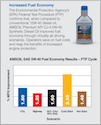 AMSOIL Premium API CJ-4 5W-40
AMSOIL Premium API CJ-4 5W-40 AMSOIL Premium API CJ-4 5W-40
AMSOIL Premium API CJ-4 5W-40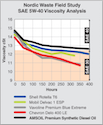 AMSOIL Premium API CJ-4 5W-40
AMSOIL Premium API CJ-4 5W-40 Diesel Recovery Cold Filter Plugging Point (794k PDF) Cold Filter-Plugging Point (CFPP) testing shows AMSOIL Diesel Recovery (DRC) lowers the cold filter-plugging point of diesel fuel more effectively than the competing brand. Note: All additives were available to consumers at the time of testing. Testing completed August 2009. Test results do not reflect future formulation changes.
Diesel Recovery Cold Filter Plugging Point (794k PDF) Cold Filter-Plugging Point (CFPP) testing shows AMSOIL Diesel Recovery (DRC) lowers the cold filter-plugging point of diesel fuel more effectively than the competing brand. Note: All additives were available to consumers at the time of testing. Testing completed August 2009. Test results do not reflect future formulation changes.  Diesel Fleet Fuel Economy Study (G2904) Testing
completed in compliance with the industry-standard SAE J1321 In-Service Fuel Consumption Test Procedure demonstrates use of AMSOIL synthetic lubricants can increase fuel economy in short- to medium-haul diesel applications and, in this case, did by 6.54 percent.
Diesel Fleet Fuel Economy Study (G2904) Testing
completed in compliance with the industry-standard SAE J1321 In-Service Fuel Consumption Test Procedure demonstrates use of AMSOIL synthetic lubricants can increase fuel economy in short- to medium-haul diesel applications and, in this case, did by 6.54 percent. Reviewed by Steven: 
Owning a 2012 VW Jetta GLI (a direct injection 2.0 T) with almost 70K mildly aggressive miles, of course I want minimum wear on bearings, cam lobes, ...etc. However, when my intake manifold was replaced at ~62K (VW recall, no charge to me), I saw first hand how much gunk had accumulated in the intake ports and valve backs and was pretty darn shocked. I was shocked especially because despite the VW-recommended 10,000 mile oil change interval, I never went more than 6-7K without changing
the factory recommended Castrol Edge 5W40 and OEM filter.
Since the manifold was already off, I took the opportunity to pay the dealer $350 to clean the ports via walnut shell blasting. Naturally, now my question is, which test(s) would be most indicative of reducing the gunk that gets past the PCV system and into the manifold to foul my valves and ports on its way to be reburned?
Re: Which test(s) are most relevant to me
Most turbo GDI engines suffer from this problem. AMSOIL will help protect these engines far better than OE oils and reduce buildup but may not stop it entirely due to engine design issues. Replied by Tech Admin
Reviewed by Traveler9897: 
When I put it in my Harley I could tell a notice difference right away I was so impressed with the oil for air cooled engines I used it in my mowers and what I would usually change my oil at the end of the year after warming up the engine it would look like a diesel motor after 15,000 miles now it looks like it’s been driven about 3000 miles nice clean roads at 50 miles an hour love the stuff I use it and everything gears lubricants even the filters
Reviewed by Go Long: 
Interesting comments and assessments. Some claim they'll stay with a brand of oil that achieved only average (or worse) results in these tests. Sadly,too many people are emotionally invested in a brand and even when scientific testing provides better choices, they'll die on their brand's hill rather than change. Also, many owners have a poor understanding of what 'severe service conditions' really means. Many think that just because they drive only 6000 or 9000 miles annually - putting around to-and-fro in town or idling along on short commutes to work - that their vehicle is not stressed enough to warrant top-of-the-line oil. Add to that formula the variety of lousy oil filters at stores and lube shops and trouble looms large even three or four years down the road.
The mechanical and thermal reality these engines face results in the very 'used car for sale' that I certainly avoid buying if I know of its usage. With 22 years
invested in buying and selling used cars, SUVs and light trucks for personal and business needs, I believe I have some knowledge of gasoline engine reality.
Reviewed by Tim: 
I recently bought a used (40,000) miles) 2017 Honda CR—V TOURING 5DR 1.5TBO/CVT SWD suv only to find out that it has gas infusion or gas contamination from turbo charger. (This problem gets worse in colder or freezing temperatures ) In my research I found someone who lives in Canada who claims that AMSOIL Signature oil will resist blow by from the fuel by up to 2 to 4 times better than most of the full synthetic oils on the market with a displacement resistance between 2400 to 3600 psi depending on the oil weight. Also, it will heat up more uniformly than based oils. It displace better and acts as an insulator. I’m hoping this will help me ( assuming this is accurate) to minimize my problem this particular car has. I’m getting updated electronic hardware on the Honda but need to consider all avenues to best keep my Honda working.
Anyone …Feedback would
be welcomed
Re: Oil…Gas Contamination ???
AMSOIL offers higher TBN (total base number), which helps neutralize combustion by-products entering the oil, offering longer usable service life for the oil, which also enhances protection. AMSOIL is also thermally stable, which prevents premature breakdown that other oils may suffer under demanding conditions such as vehicles with direct injection and turbo. Replied by Tech Admin
Reviewed by Plutus: 
Am using petro canada synthetic for over 15 years in our fleet of cars. We never had premature wear issues or sludge deposits in the engine. Most cars are going over 200k km then either scrapping or trading for new ones.
Will definitely continue using petro canada.
Reviewed by Eric B.: 
I will continue using Castrol Edge Titanium at the recommended 0-W 20 weight because i have direct injection and a turbo, The Castrol Edge is best at lowering carbon deposits and even though I installed an oil catch can I want that protection from carbon buildup. PLUS my dealer and warranty (for Las Vegas,
NV) requires a 5,000 mile oil change interval so Castrol edge will handle it well.
I'll get a 30,000 mile interval valve cleaning with BG fluid by my dealer.
BUT, if I can find 0- W20 AMSOIL for less I'll switch.
Reviewed by Lynn : 
I just bought a 2019 Mazda cx3 gs and the Mazda dealer uses Petro Canada synthetic. If I was to change oil myself I would not use amsoil even though it handily won the test. Since this vehicle is my wifes car, it will rarely see more than 8,000 km(5,000 miles) per year. Under warranty the oil has to be changed twice yearly and as any synthetic will easily protect in that low mileage, I will go with what I have been using since 1997. That would be Mobile 1 along with their filters. I have a 1996 GMC with over 225,000 km and I change oil once a year with about 9,000 km and it uses no oil between changes. I also have a 2012 Rav 4 that I drive between 7,000-8,000 km per year with annual oil changes. When the oil is checked before changing it is still very clear. If I was a high mileage driver and put 20,000 to 25,000 km per year, I would more than likely use amsoil.
Reviewed by David Hemelite: 
I have seen this test previously but I shall stick with Petro Canada Supreme Synthetic. My Subaru loves it.
Re: Test driver
Just imagine how much more your Subaru will love a better synthetic like AMSOIL? Replied by Tech Admin
Reviewed by Perry G: 
This is the first actual time I have ever examined synthetic motor oils this closely. While I want the very best stuff in my engine it would seem the regard I have had for what I had been using was not correct. Viewing this has been extremely instrumental for my making a more informed decision on what lubricants I need to select the next time I do an oil change or transmission fluid change.
Re: Synthetic Oil Comparison Review
Thanks Perry for taking your time to write this. Lubricants are something people generally fail to research to find the best. It is common to buy them based on advertisements and gut feelings. Only a fraction of the population think about verifying advertisement claims and to see if they have better options. It looks like you have done your homework! Replied by Tech Admin
Reviewed by korner: 
I didn't just rank them in each test category and then total up the results like the previous poster. Instead I grouped them by penalty points with the best in each test receiving one penalty point and the rest having a multiple penalty total in each test based on the actual graph test value of the best one in each test group. I rounded the penalty multiples to the nearest integer. The only fallacy with my procedure is that it assumes an even weighting for each test category. I am sure someone could come up with a weighted formula for each category that would reflect how each category affects engine longevity. In that case it would be trivial to adjust each penalty in each category to reflect those weightings. That would be the most exact fairest way to have a winner. Even so it is clear that Amsoil is the winner on all methodologies unless the Noack test is so much more important than the others.
Reviewed by Terry : 
I totaled the points for each of the oils and found that Amsoil is about 3 times better then most of the other oils. Not that I was surprised but this really told the story. If you want the best the go with Amsoil. It just can't be beat.

 Canada
Canada United States
United States
Reviewed by Brian:
appears to be a fair and honest evaluation.
Availability is also a consideration. With that factored into the equation....Pennzoil Ultra Platinum will most likely be my choice.